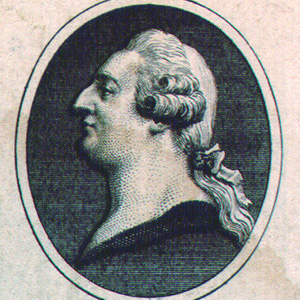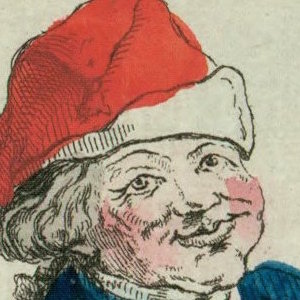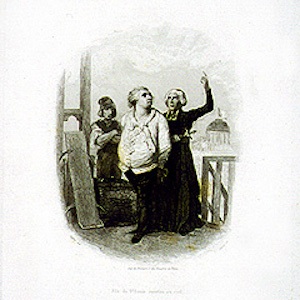Early Modern (1450 CE - 1800 CE)

Louis as No More Than a Man
Part of the revolutionary undermining of the monarchy becomes evident in this profile of Louis XVI, shown here without his wig or finery.

Louis as a Drunkard
This image of Louis, already altered by commoner attire and a Phrygian cap, added a raised bottle. This transformation could scarcely have been anticipated even a year or two into the Revolution.

Louis as a Drinker
The arrest of the King prompted an outpouring of sentiment against Louis. Like his grandfather, Louis XV, whose early reputation as "Louis the Well–Loved" faded by the end of his long reign, Louis XVI now became the focus for all sorts of discontents.

Louis XVI, King of the French, born 23 August 1754.
Early in the Revolution, LaFayette was among the most visible and popular leaders, in part because of his participation in the American revolution and his relationship to George Washington, Thomas Jefferson, and others. Further, though noble, he had been sympathetic to the Third Estate.

Long Live Liberty
Cartoonists extrapolated more and more on a new Louis as the Revolution went along. Here, a rather rumpled King, dressed more like a shopkeeper than a monarch, opens a cage to let liberty out.

Louis XVI, King of the French
This fascinating print, likely produced before the King’s flight from Paris, takes the Louis XVI of the old regime and makes him a revolutionary with the addition of the Phrygian cap.

Louis XVI
Here was the "body politic" of the old regime. Theoretically, France existed only as an entity in the body of the King. The citizens were his subjects; the geographical parts linked together only through the monarch. Robed and wigged, he was an emblem of a centuries–old regime.

Execution of Louis XVI, January 21, 1793, 10:22 in the morning
This image shows much the same scene on the platform as the preceding one, but the surroundings are much more in evidence. Visible here are the troops. Eight to nine thousand were mobilized to avoid any efforts at rescue.

Son of Saint–Louis Going Up to Heaven . . .
Many scholars would argue that Louis XVI’s finest moment came from his bravery at his execution. Even when he was forbidden from saying a last few words to those gathered to see him executed, he remained unflinching, retaining his composure.

Louis XVI and His Family (20 January 1793)
Not shown in this or other scenes here is the fact that between the King’s two visits he ate a last meal. At this time he was denied, as was custom, a knife to avoid suicide. Louis was angered that his jailers thought he was so sinful as to take his own life.